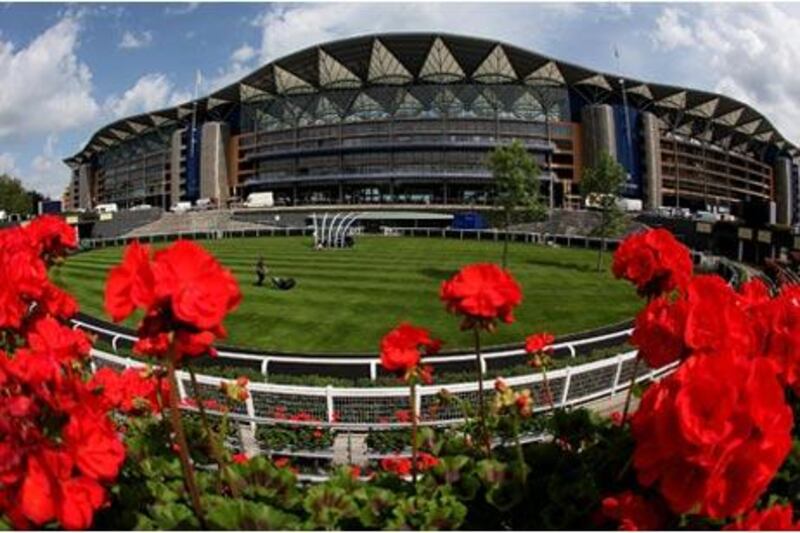ABU DHABI // Ascot has hosted racing since Aug 11 1711 but in its 298-year history there has never been a purebred Arabian contest on the hallowed turf near Windsor - until now. July 25, shortly before the Royal course's anniversary month, welcomes The President of the UAE Cup Series immediately following the prestigious Group One King George VI and Queen Elizabeth Stakes thoroughbred race.
It's fitting that desert horses should get their chance at the esteemed track on that date for two reasons; first, the inaugural race at Ascot was not a thoroughbred contest at all but a gruelling test of stamina undertaken by heavy English hunters over three four-mile heats and, second, the modern-day thoroughbred owes its existence to the introduction of three Arabian stallions to England in the late 1600s and early 1700s.
The ancient Arabian, with Middle Eastern roots that can be traced back almost 4,500 years, has now come full circle and is to showcase its talents at one of the world's most famous racetracks in an agreement covering the next five years. It's a significant year for the President's Cup series too, which celebrated its 15th anniversary with the opening race of its four-contest season in Chantilly, France on July 5. Other legs include Ascot followed by Moscow on August 15 and Baden Baden in Germany in October.
Established by Sheikh Zayed bin Sultan to promote and celebrate the Arabian horse, the President's Cup is now sponsored by Emirates Equestrian Federation (EEF) and held under the instructions of Sheikh Khalifa bin Zayed, President of the UAE and Ruler of Abu Dhabi, Sheikh Mohammed bin Rashid, Vice President of the UAE and Ruler of Dubai and Sheikh Mohammed bin Zayed, Crown Prince of Abu Dhabi. Deirdre Hyde, former stud manager at Royal Stables, who now occupies the same post at Wrsan Stables, said it was important Arabian racing was on a major card at Ascot.
"It's a very significant development. The purebred Arabian, as a smaller and finer breed than the thoroughbred, has traditionally been seen merely as a pretty show pony in some circles," she said. "But Sheikh Zayed felt strongly that the characteristics of the breed as a strong, tall, resilient and noble animal must not be lost. "He started The President of the UAE Cup as a way of promoting the retention of these important traits in the Arabian and encouraging others to view them as legitimate sport horses."
Hyde, who came to the UAE in 1992, is an expert on Arabian breeding and has helped oversee the development of blood lines in the country and also witnessed the rapid rise of Arabian racing in the region and further afield. "There are major movements around the world towards the Arabian as a sport horse and the ruling families in the UAE have been key to it's promotion," she added. Taleb al Muhairi, Secretary General of the EEF, will be at Ascot to witness the ground-breaking race. "Most people don't realise thoroughbreds are linked to the Arabian and people around the world who watch the King George at Ascot will see our race immediately afterwards," he said. "The timing is key; Arabian races have often been held as the first race on a card, before everyone arrives at the track, or the last race when everyone starts to leave.
"This race is being given the billing it deserves and marks the partnership between the UK and UAE." Trainer Rod Simpson won the recent Group Two Abu Dhabi International Stakes at Newmarket with Sheikh Khalifa's Fryvolous and will saddle the top-rated Arabian in Sunday's Dubai International Arabian Race Day, sponsored by Sheikh Hamdan bin Rashid at Newbury, England. "Its great to see an Arabian race at Ascot for the first time," said the handler, who also won the Dubai Kahayla Classic with his charge, ridden by regular jockey, Daragh O'Donohoe, on Dubai World Cup night. "If people look down on Arabian racing in Europe then I'm sorry to say it's just ignorance.
"They may look smaller but we race and train them the same way and they are just as important as thoroughbreds - in fact these races are probably more international than most thoroughbred races. At Ascot the crowds and television audience will see the best four-year-old Arabian horses in the world and in the paddock some of the most passionate owners who may compete for smaller prize purses than the thoroughbreds but who want to test their horses in the true spirit of competition. Once you get into Arabian racing you realise how addictive it is."
Simpson has two runners in the £50,000 (Dh300,676) Ascot race, Elmalak Elwaheed and Jazeerat Alsadyaat, both owned by Sheikh Khalifa. Successful UAE-based Arabian trainer, Gillian Duffield, saddles Al Janoob and Riko for Sheikh Hamdan bin Rashid, Deputy Ruler of Dubai, while the Emirates flavour continues with Dourat Nour and Rabah de Carrere, prepared by Georgina Ward and owned by Mohammed Saeed Nasser al Rumaithi.
Saudi Arabia, Great Britain, France, Morocco, Qatar, Germany, Holland and Jordan are also represented. Ascot's CEO, Charles Barnett, said the venue was happy to follow in the footsteps of Longchamp in France which added a Qatar-sponsored Arabian race to its Arc-day card last year. "The King George is our most important thoroughbred race of the year and this day provides the ideal platform for our inaugural Arab race," he said. "The timing of the race was something that was important to the Emirates Equestrian Federation and we were very happy to oblige."
There is no doubt that the inclusion of an Arabian race as a major billing at Ascot - a course established by Queen Anne and visited every year by the current British Monarch - is an important development for the sport. stregoning@thenational.ae





